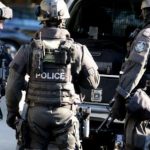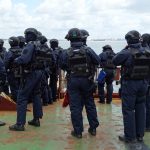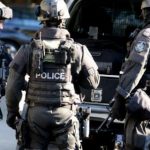NSW Government’s Anti-Terrorism Hotline a “Dismal Failure”

A multi-million-dollar NSW government hotline which encourages the reporting of radicalisation and violent extremism, and provides advice and counselling, has been called a “dismal failure”.
Despite costing millions to set up, NSW Minister for Counter Terrorism, David Elliot, says the ‘Step Together’ service has received “around 5 calls” so far – one of which was a “wrong number” and another from a “parent worried their kid was dating a Muslim”. The service has received no credible leads to date.
Costing $3.9 million over three years, the call-centre initiative is part of a $47 million NSW government program designed to fight radicalisation.
The hotline was established in response to the killing of NSW police accountant Curtis Cheng by 15-year old Farhad Jabar, in an alleged terrorism plot.
At the time, the government said the service was equipped to deal with concerns about different kinds of radicalisation, including people whose relatives are involved in far-right or religious extremism.
It is also intended to provide advice and counselling, and is staffed by professional counsellors seven days a week from 7:00am to 9:00pm.
Community mistrust
Muslim community leaders say they warned the government that the service was unlikely to garner trust, because of its perceived links to intelligence gathering and policing agencies.
Social service and community workers involved with Muslim communities say the government is spending unwisely, calling for a more ‘community-oriented’ approach to assisting those at risk of radicalisation.
Youth radicalisation
Muslim leaders suggest that feelings of exclusion and rejection, combined with unemployment and boredom, are primary reasons for young Muslims being drawn to terrorist groups or otherwise planning to engage in “home grown terror”.
They say that when young people feel stigmatised and persecuted for their appearance and religious beliefs, they can become easy targets for radical groups that promise to provide them with a sense of purpose and belonging.
Others believe that in theory, the hotline seems like a workable initiative, but the fact it has been launched under the Department of Counter Terrorism sends the wrong message.
National hotline
Australia’s National Security Hotline is a federal government initiative set up in 2002 in the wake of the terror attacks on the World Trade Centre and Bali bombings, with the marketing slogan ‘If you see something, say something’.
The service doesn’t market itself as advisory, but as a strictly reporting hotline with all information relayed directly to ASIO, as well as federal and state police.
The hotline has received 5,293 calls in the two months of July and August this year.
For now, the NSW Government is defending the ‘Step Together’ hotline, with Minister Elliott considering upscaling marketing efforts. He says the call centre only needs “one call and it’s paid for itself.”
More police powers and new prisons
Meanwhile, the NSW government has taken a number of other measures to deal with the threat of terrorism, including giving police new “shoot to kill” powers and financing the construction of a new “mini-max” prison to detain inmates considered at risk of radicalisation.








